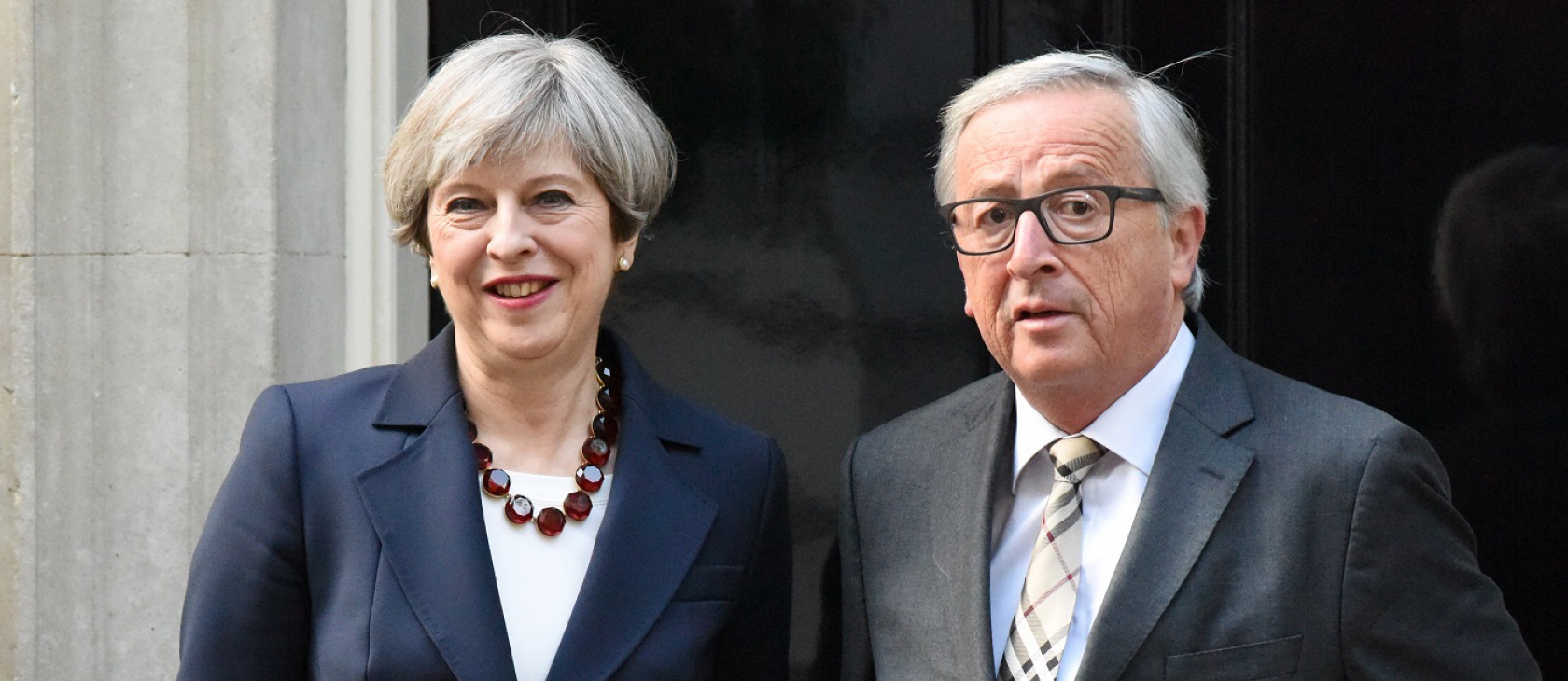The British Parliament continues its debate on Theresa May’s Brexit deal, with a final vote scheduled for next Tuesday, January 15. In the upper chamber, the House of Lords, the Archbishop of Canterbury Justin Welby said on January 9 that a “no deal” Brexit would be a "moral failure," and a second referendum might be required. Demands for a “second referendum” to reverse the initial Brexit vote inspired me to share some observations with readers of Religion & Liberty Transatlantic about the nature of sovereignty and self-determination, where the Brexit debate stands, and the morality of economic freedom.
Vote right, or vote again
A classic strategy of the EU establishment is that if the people of any nation are asked to grant more power and sovereignty to Brussels and give the “wrong” answer, then they must vote again until they give the “right” answer. The Danish began the trend by rejecting (by a vote of 51 per cent) the Maastricht Treaty, which transformed the European Economic Community (EEC) into the political European Union, in 1992. Since this was the “wrong answer,” back to the polls they went in 1993 to approve the Treaty (by 57 per cent). In 2001, the Republic of Ireland voted 54 per cent to 46 per cent to reject the Treaty of Nice, which was concerned with enlarging the European Union, as well as its political structure. So, the Irish were marched back to the ballot box in 2002 in order to give the correct answer, which they did by approximately two-to-one.
The trend continued in 2005, as the French voted on the ratification of the EU Constitution and gave the wrong answer – rejecting the Constitution by 55 per cent to 45 per cent. A few days later the Dutch people gave the wrong answer on the same question, by 62 per cent to 38 per cent. The Constitution was repackaged as the Treaty of Lisbon and ratified by both the French Parliament and the Dutch Parliament – without a referendum. The stubborn Irish voters did not wish to be left out so had another go; the misbehaving Irish rejected the Treaty, 53 per cent to 47 per cent, giving the wrong answer for a second time. Guess what happened? A year later, the Irish voters were made to vote again, to ensure that they gave the right answer, which they did, again by two-to-one.
In every case, the right answer must be given, and the right answer is victory for the EU.
In the Brexit referendum of June 2016, there was the largest turnout ever in British electoral history, and the country voted 52 per cent to 48 per cent to leave the EU. Mapped across Parliamentary voting districts, according to the House of Commons Library, it is estimated that 408 out of 650 districts voted to leave.
After various legal wranglings, the British Parliament passed two pieces of legislation. The first was the formal act to notify the EU under its Article 50 provision that we intended to leave. This set in motion a two-year period to exit, ending on March 29, 2019. The Bill passed the House of Commons by 498-114 votes. Then the EU Withdrawal Bill – which codified that date and, on that departure, repeals the 1972 European Communities Act by which Britain acceded to the various treaties – also passed the House of Commons, in June 2018, rather narrowly and with various concessions from government guaranteeing future votes, by 326-290.
So, as we arrive at the next round of voting, two things are certain. First, Parliament has legislated that the UK will leave the EU on March 29, 2019. As statute can only be changed by statute, the UK will leave on that date unless the government enables Parliament to change the law. Second, the EU, and the political establishment, are absolutely resolved to do everything possible to keep the United Kingdom aligned as closely as possible to the European Union. It is in their interests to do so. There is a clear tension between these aspects which is, of course, one reason for all the chaos.
Let’s return briefly to the Archbishop of Canterbury’s moral point – that to leave without a deal would be a moral failure and a second referendum might be required. The question posed in the 2016 Referendum was, “Should the United Kingdom remain as member of the European Union or leave the European Union?” It is surprising that seeking to ignore or reverse the decision of the biggest democratic vote in British history, on a matter not directly dealt with by scripture or tradition, can be deemed moral. It is equally surprising that enforcing that vote could be considered a moral failure. In fact one might think that the true moral failure would lie in the failure to implement the decision of the people. This would be clearer if archbishops and opinion shapers had a vision for a flourishing, independent, trading nation able to honour the views of the electorate and build on our traditional transatlantic and commonwealth alliances.
History shows us that we need to be very wary indeed of such siren voices as those of the Archbishop and others. They, and the EU will stop at nothing to frustrate Brexit, while deeming themselves morally superior.
So, as we approach another vote, where do things stand?
Theresa May’s Brexit deal
The British prime minister, the valiant but ineffectual Theresa May, finalised a proposed Withdrawal Agreement with the EU. Few like the agreement, especially those who voted to leave. Why? The majority of concerns about May’s Brexit deal, which runs nearly 600 pages, centers around the requirement for the UK to remain aligned with the EU rule book and, potentially, remain in some form of Customs Union. This is often described as the UK remaining a “rule-taker,” even a “vassal state,” which will be unable to negotiate independent trade deals or leave the EU’s common external tariff in perpetuity – unless the EU agrees to change the arrangement.
This is where the so-called “Irish backstop” comes into play. When the UK leaves the EU, there will be one border between Northern Ireland, which is part of the UK, and the Republic of Ireland, which is an EU member. Currently, there is free flow of goods and people across the border, which both facilitates local trade and ensures that people can visit friends and family across the border without hindrance. This is an important part of the Good Friday Peace Agreement which largely settled decades of violent conflict. So, the EU position is this: Nothing changes during the 20-month transition period that commences in March 2019 – a concession for which the EU charges the UK £39 million. But upon exit, if no alternative free-trade agreements have been signed, the entire UK will remain in a Customs Union-type arrangement.
However, if the UK remains customs-aligned, we will not be free to set our own regulations and tax regime. Consequently, the EU will have blunted our competitive edge. Therefore, there is an enormous incentive for the EU not to agree a free-trade agreement.
The entire backstop debate is an utter red-herring and easily solvable.
- First, there is no reason at all, why, if both parties will it, that there cannot remain a free-trade area for 10 miles on either side of the border. The Northern Irish farmer sending his milk to be processed south of the border could continue to do so.
- Second, there are relatively straight-forward technological solutions to cross-border trade outside of this area: trusted traders, customs declarations at points of origin or destination, and so on.
- Third, the idea that if an “open border” is maintained that trucks and transporters are all going to divert via Ireland in order to avoid customs duties is risible. A haulage company in Manchester will not send its trucks first to Belfast (Northern Ireland), and then to Cork (Irish Republic), and then via sea to Europe. Nor will this be true vice-versa.
So, in essence, the backstop is completely unnecessary – unless you are the EU, protecting your interests, defending your privileges, and seeking to protect your markets against free trade with an UK that has established a more welcoming and dynamic economy.
Next Tuesday’s vote
To complicate matters, the House of Commons has a clear Remain majority. The Speaker of the House has, this week, overturned centuries of precedent, and overturned the legal advice of the House’s most senior official, in order to approve an amendment that makes things harder for the government if May’s Brexit deal were to fail.
And this is the dilemma: The May deal is pretty awful and will probably be defeated in Parliament when put to the vote next Tuesday, January 15. Unless there is new legislation, or the government decides (with or without a vote in Parliament) to seek an extension of the Article 50 deadline (and ministers do have the power to change the exit date in the Withdrawal Act), then we will leave the EU on March 29. Yet, the forces arrayed against this position are formidable.
Interestingly, much depends on Theresa May. She survived a motion of no confidence as leader of the Conservative Party promoted by the Brexiteer faction of the party. If she decides to tough it out, there is little, beyond guerrilla Parliamentary tactics, that opponents can do. However, May’s record in holding to her positions is not encouraging. And, as suggested, we should not underestimate the power and determination of the political establishment (the British equivalent of what U.S. voters call “The Swamp”).
What happens next
Where do we go from here?
A second referendum? Possible, but not very likely. Polls indicate that the Remainers might lose again.
A General Election to elect a new prime minister? This is the option favoured by the Labour Party, but it is not very likely. And it might not solve the issue, as Corbyn largely opposes the EU.
An extension to Article 50? This, too, is possible – but unless it enables another referendum, or buys time for an alternative deal (which seems impossible), it is not clear to what end.
Will Theresa May bring a somewhat tweaked agreement back to the Commons? This would likely be a “softer” Brexit, worse from the Brexiteer point of view, and be presented as a final vote on “her deal or no deal.” In my view, this is quite a likely outcome.
The EU and their supporters simply cannot countenance any idea of the UK going its own separate way. If only we had a prime minister like a Margaret Thatcher, with the vision to chart a bold course toward independence, to lower corporate tax rates in order to attract investment, to reduce to the minimum tariffs on trade, to set people free economically as well as politically, to find new and renewed trading partners. If only church leaders saw economic freedom as a means of generating prosperity and allowing people to provide for their families.
If only….




